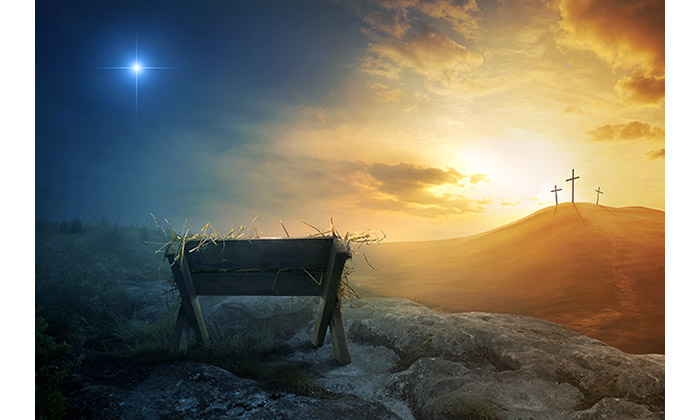What person knows all the treasures of wisdom and knowledge hidden in Christ and concealed in the poverty of his flesh?
Scripture says: Although he was rich, yet for our sake he became poor, so that by his poverty we might become rich. When he made mortality his own and made away with death, he appeared in poverty; but he promised riches, riches that were only deferred – he did not lose riches that were taken away from him.
How great is the abundance of his goodness which he hides for those who fear him, which he perfects for those who hope in him! Our knowledge is partial until what is perfect comes. To make us fit to receive this perfection, he who is equal to the Father in the form of God and made like to us in the form of a slave, transforms us to the likeness of God. The only Son of God, made son of man, makes many sons of men sons of God. The slaves, sustained by the visible form of the slave, he frees and makes children so that they may see the form of God.
We are God’s children; it does not yet appear what we shall be, but we know that when he appears we shall be like him, for we shall see him he as he is. What are those treasures of wisdom and knowledge, what are those divine riches, except what is sufficient for us? What is that abundance of goodness, except what fills us? Show us the Father, then, and it is sufficient for us.
In one of the Psalms someone says to him from among us or within us or for us: “I shall be filled when your glory is manifested.” He and the Father are one: whoever sees him sees the Father also. So then, he the Lord of hosts, he is the king of glory. He will bring us back, he will show us his face; and we shall be saved, we shall be filled, he will be sufficient for us.
Until this happens, until he shows us what is sufficient for us, until we drink from him as the fountain of life and are filled, until then we are exiles from him and walk by faith, until then we hunger and thirst for justice, and long with a passion beyond words for the beauty of the form of God; until then, let us celebrate his birth in the form of a slave with humble devotion.
This article is excerpted from a Sermon by Augustine of Hippo (354-430 AD), [Sermon 194, 3-4, PL 38].
Top image credit: Illustration of the Nativity manger and the cross of Jesus Christ, from Christianphotoshops.com, illustraton © by Kevin Carden. Used with permission.
Aurelius Augustine was born in 345 in the town of Tagaste, in Roman North Africa, in what is today Algeria. His mother was Monica, a very devout Christian who had a significant influence on her son’s life. His father, named Patricius, was a pagan of significant status in society. Patricius became a Christian shortly before his death.
Augustine was educated at Carthage where he enjoyed academic success. He also enjoyed the party life, and at the age of 17 fell in love with a woman whom he never named. They lived together unmarried for 13 years and had a son whom Augustine named Adeodatus, meaning “gift from God.” His son died in his youth.
At the age of 19, after reading Cicero’s Hortensiusat, Augustine fell in love with philosophy. He later wrote, “It gave me different values and priorities. Suddenly every vain hope became empty to me, and I longed for the immortality of wisdom with an incredible ardour in my heart.” While he pursued Platonic philosophy and the theology of the Manichaens, a Christian heretical sect, he became restless for truth and virtue. Shortly before his 30th birthday, Augustine encountered Ambrose, the saintly bishop of Milan. Augustine was moved by Ambrose’s example and his inspired teaching and preaching of the gospel. At the age of 32 Augustine found peace with God and was baptized by Ambrose during the Easter liturgy in 387. Augustine returned to North Africa and formed a monastic community with a group of friends. He was ordained a priest in 391 and became a noted preacher. In 396 he reluctantly became a bishop and remained the bishop of Hippo until his death in 430. He left his monastic community, but continued to lead a monastic life with the parish priests of Hippo in his episcopal residence. Augustine died on August 28, 430, during the siege of Hippo by the Vandals.
Augustine was a prolific writer and original thinker. His numerous writings, including theological treatises, sermons, scripture commentaries, and philosophical dialogues, number into the hundreds. His autobiography, the Confessions, was considerded the first Western autobiography. It was highly read among his contemporaries and has continued as a classic throughout the ages.
Augustine is one of the most important figures in the development of Western Christianity. He is esteemed as a great Latin church father and a Doctor of the Roman Catholic Church. Many Protestants consider him to be one of the theological fathers of Reformation teaching. Among Orthodox he is called St. Augustine the Blessed.



